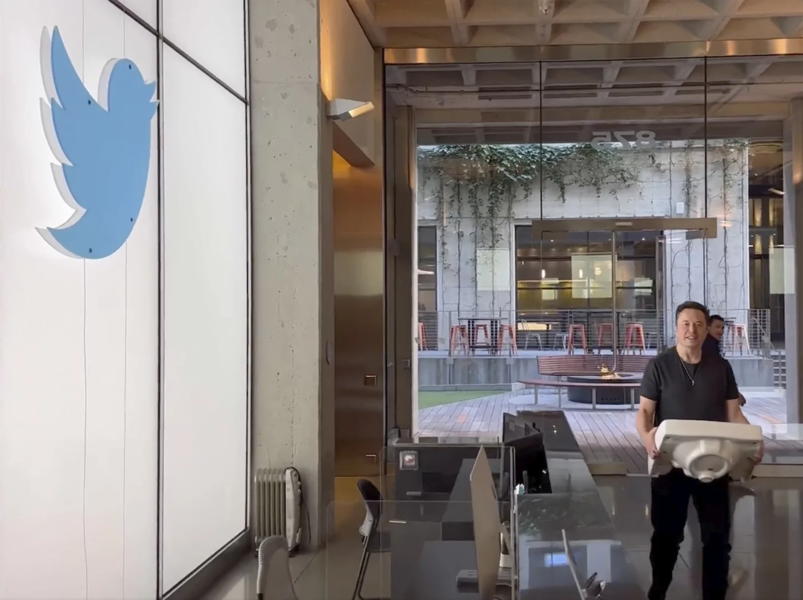It was a long, rocky road to get there, but Elon Musk marked his takeover of Twitter by strolling into the company’s headquarters on Wednesday, October 26th holding a porcelain sink. Yes, a sink. “Let that sink in!” he posted on his Twitter account, while also changing his profile to read “Head Twit.” Guy’s got jokes.
With his $44 billion deal finalized, the Head Twit immediately started taking his new role very seriously. Among his first orders of business were the firings of Twitter Chief Executive Parag Agrawal, Chief Financial Officer Ned Segal and legal affairs and policy chief Vijaya Gadde. He had accused them of misleading him and Twitter investors over the number of fake accounts on the platform. He also plans to cut more jobs, leaving Twitter’s 7,500 employees fearing they will be gone in the next few months.
But now what? Not a whole lot of specifics are known about his plans for the future of the social media platform, but details are emerging every day. He’s floated lots of ideas, from defeating spam bots to launching Twitter into an “everything app” called X.
However, users are divided on how they feel about Elon’s new leadership role. Some are rejoicing, but some have already jumped ship. Not surprising, since this change comes with a host of potential political implications, the biggest divider of all. Especially with the timing coming right before the midterm elections.
“The bird is freed,” Musk tweeted on Thursday, October 27th, referencing Twitter’s bird logo in an apparent nod to his desire to see the company have fewer limits on content that can be posted. This sentiment supports previous comments he’s made regarding loosening censorship of online speech and reinstating banned users, most notably Donald Trump.
Yet, Musk has been careful about outlining his future plans since becoming boss, indicating that there will need to be some limits. Some critics say he’s backtracking and some say he just realizes he needs to appease advertisers, but in an open letter, he tried to put worries at ease by writing, “Twitter obviously cannot become a free-for-all hellscape, where anything can be said with no consequences!”
In a “just a reminder” moment, European regulators also reiterated past warnings that, under Musk’s leadership, Twitter must still abide by the region’s Digital Services Act, which levies hefty fines on companies if they do not control illegal content. “In Europe, the bird will fly by our EU rules,” EU industry chief Thierry Breton tweeted on the morning of Friday, October 28th.
Still, some here in the US fear that changes in Twitter’s policies over the next week could result in the spread of misinformation leading up to Election Day. Prior to Musk’s takeover, Twitter formed an “Election Squad,” to spot election falsehoods, detect bots pushing propaganda and other violations. The employees involved in the company’s efforts are forging ahead for now, but many are privately worried that Musk could soon halt or undo some of their work.
Everything we know is all so preliminary, but on the surface it does seem like Elon Musk, the self-proclaimed “free speech absolutist” is interested in finding a moderate balance. Also in his open letter, he said he wants the social network to be a digital town square where a “wide range of beliefs can be debated in a healthy manner without resorting to violence.” He then goes on to say, “There is currently great danger that social media will splinter into far right wing and far left wing echo chambers that generate more hate and divide in our society.”
It will be interesting to see how this all unfolds and affects the future of social media.
Photo: Elon Musk via AP



